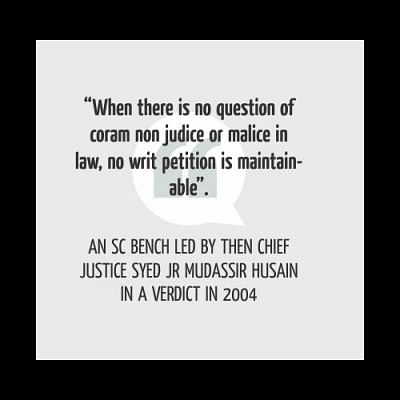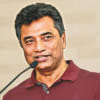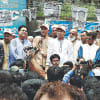SC verdicts hold hope for polls

Some previous verdicts of the Supreme Court about disputes over elections now offer the Election Commission strong legal grounds to have the stay orders on Gazipur and Dhaka north city mayoral polls vacated.
SC verdicts since 1988 did not allow writ petitions to halt an election after its schedule had been announced, unless there were gross irregularities in the electoral process.
Just 10 days before the voting day, a High Court bench on Sunday stayed the Gazipur City Corporation polls for three months. The HC bench issued the order in response to a writ petition filed on the same day challenging the validity of inclusion of some areas of a union parishad of Savar upazila in the Gazipur city areas. The petition was filed more than a month after the announcement of election schedule.
The court also ordered the EC and the government to explain as to why inclusion of six mouzas of the union parishad in the Gazipur City Corporation and the election schedule should not be declared illegal.
When the order was issued, the EC was in the dark about the development. However, it postponed the election immediately after the stay order.
In January, the same bench stayed for six months the by-polls to mayoral seat in the Dhaka North City Corporation in response to two writ petitions.
The petitioners challenged the legality of the election schedule on alleged grounds of non-publication of voter list of 18 wards newly incorporated in the DNCC.
The election was scheduled to be held on February 26. The EC appealed against the stay. The SC on February 25 asked the HC to expedite disposal of the issue.
This time around, the EC has no alternative, but to appeal against the HC stay on Gazipur city polls.
"We will decide about filing the appeal on receiving the copy of the court order,” Election Commissioner Kabita Khanam told journalists yesterday in her office.
Some landmarks SC verdicts on the electoral disputes might be recalled and used as precedence.
In 1988, the SC in a verdict redefined the High Court's writ jurisdictions in issues arising from the electoral process.
In AFM Shah Alam versus Mujibul Haq, the SC said the writ jurisdiction was not available “in any issue relating to election except in very limited cases of coram non judice [total absence of jurisdiction] or malice in law”.
"Save in the two cases each [coram non judice and malice in law] and every election dispute must wait till completion of the election to be placed before the election tribunal for determination on evidence," it asserted.
This rule was defended in another case the following year by the SC bench-led by then chief justice Shahabuddin Ahmed.
Justice Mohammad Habibur Rahman, Justice ATM Afzal, Justice Mustafa Kamal, and Justice Latifur Rahman were in that bench and all of them later became the chief justice of Bangladesh.
In 2004, an SC bench led by then chief justice Syed JR Mudassir Husain relied on the rule made in the 1988 to set aside a High Court verdict which was delivered following in a writ petition on an election dispute.
In this case, Abdul Halim Gazi versus Afzal Hossain, the SC reiterated that “when there is no question of coram non judice or malice in law, no writ petition is maintainable”.
In July 2010, in Mohiuddin Khan Alamgir versus EC case a six-member bench of the SC led by then chief justice Fazlul Karim also stood by the SC's 1988 verdict. Other members of the bench were Justice MA Matin, SAN Mominur Rahman, ABM Khairul Haque, Mozammel Hossain and SK Sinha.
Except Justice Matin and Mominur, the other three were appointed chief justice of Bangladesh later on.
In that verdict, the court said the election process begins with the announcement of the schedule and ends with the publication of the election results in official gazette. A court cannot interfere in the electoral process. A court can interfere only on grounds of coram non judice or malice in law, it asserted.
In the 1990 verdict, the SC bench led by then chief justice Shahabuddin Ahmed referred to the verdict of Indian Supreme Court delivered in 1952 in N.P. Ponnuswami versus the Returning Officer case. In that case the Indian apex court completely barred any court from interfering in the election by allowing any writ petition.
Over the years, the Indian SC upheld this and dismissed some orders issued by the High Court.
"Election is a democratic process which cannot be interfered with," said the Indian SC on May 12 last year on a petition alleging duplication in the voters' list for the scheduled Bhiwandi municipality polls in Maharashtra.
"The election process cannot be interfered with, otherwise it could create havoc in the election. In almost every voters' list, you may find this. If the court will stay election on these reasons, there will be no elections in India. It is a democratic process. We are not going to hear it," said the SC.
The apex court made the observation while hearing a plea challenging the Bombay High Court's order dismissing a petition which alleged that there was duplication of 50,922 names in the voters' list prepared for the Bhiwandi civic polls, which was scheduled on May 24, according to a report of Indian newspaper The Economic Times.
On February 22, 2016, in another verdict on the election of dental council of India, the Indian SC once again reiterated the settled rule that once the process of election starts, no court should interfere in the election process.
In his petition, dentist Vishwanath argued that his name was not in the electoral roll of the register of dentists for the state and his nomination form had not been accepted by the returning officer.
Aggrieved by the decision of the RO, the petitioner filed a writ petition with the Kerala High Court challenging the validity of the rejection of his nomination paper. The HC directed the returning officer to conduct the election afresh after including Vishwanath's name.
Vishwanath's opponent filed petition with the SC challenging the Kerala HC decision. The apex court held that the Kerala High Court was not right in interfering in the process of election, especially when the process of election had started upon publication of the election programme.
The observations made by the SC in this case are significant: “Very often, for frivolous reasons candidates or others approach the courts and by virtue of interim orders passed by courts, the election is delayed or cancelled and in such a case the basic purpose of having election and getting an elected body to run the administration is frustrated."

 For all latest news, follow The Daily Star's Google News channel.
For all latest news, follow The Daily Star's Google News channel. 








Comments